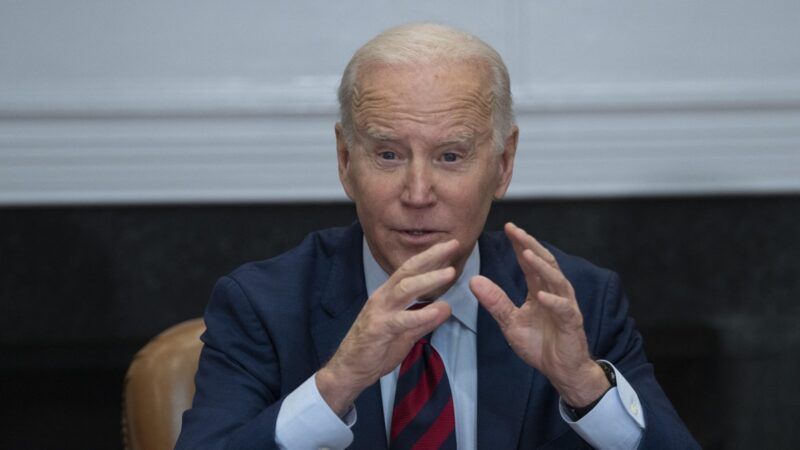Biden Wants Schools That Please Politicians, Not Parents
Educators should be responsible to parents and students, not to the government.

The Biden administration is frequently accused of hostility to school choice—or at least to choice for families that can't afford to pay private tuition on top of taxes for government institutions.
In their defense, the president's allies claim they favor options but want to ensure that such schools are accountable for the dollars they spend and the results they produce. But Biden and company show their hand by dismissing the role of parents and students who are best positioned to assess education offerings; they prefer rules that make educators responsible to the government instead of to families.
For evidence of the president's opposition to school choice, you don't have to look far. On the campaign trail in 2020, then-candidate Joe Biden said, "When we divert public funds to private schools, we undermine the entire public education system. We've got to prioritize investing in our public schools, so every kid in America gets a fair shot. That's why I oppose vouchers."
"Why are unions and Democrats so opposed to giving poor children a choice in schooling?," The Washington Post editorial board, usually a Biden ally, asked last year. It warned of the peril faced by federally funded scholarships to send struggling D.C. children to private schools in "House Democrats and the Biden administration quietly laying the groundwork to kill off this worthy program."
"I am not a charter school fan," Biden insisted about the publicly funded but independently managed schools, "because it takes away the options available and money for public schools."
More recently, the administration had to backtrack on proposed rules for federal grants to charters that would have given traditional school districts virtual veto power over the competition. The final rules are less draconian, though still intrusive.
When pressed, Biden and company frame the hurdles they place in the way of alternatives in terms of making voucher recipients, charters, and private schools responsible for their conduct and results.
"In the context of these rules we've really focused on three goals, right, the first is how do we think about fiscal responsibility, accountability, and transparency," Roberto Rodriguez, assistant secretary at the U.S. Department of Education, explained at a recent Brookings Institution charter school conference. "Those regulations include new efforts to support data-driven community needs assessments."
"The rulemaking that we've proposed is not an effort to tear down the charter school sector," Rodriguez insisted.
Charter schools and, presumably, other alternatives are fine then, so long as they justify their existence to the education bureaucracy. But that misses an important point: All learning options are already accountable, or should be, to the people who see them in action every day.
"16.6 percent of all parents chose new schools for their children within the past year, 11.3 percent considered new schools, and 25.8 percent are currently considering new schools," the National School Choice Awareness Foundation announced in a survey published this week. "In total, 53.7 percent of parents considered or are considering choosing a new school."
On display in such figures is the constant process of parents assessing their children's education and holding learning institutions accountable by considering alternatives. What kind of alternatives do parents consider? Take your pick.
"Nearly half of parents (45.6 percent) said they considered traditional public schools within their neighborhoods, while 38.2 percent considered public schools outside of their district or zones," the survey found. "31.5 percent of parents considered public charter schools, 29.1 percent considered private or faith-based schools, 22.9 percent considered homeschooling, 20.8 percent considered full-time online schooling, and 4 percent considered microschooling or pod learning."
Parents don't need distant bureaucrats trawling through data to assess "community needs" when they're making their own decisions on the fly and determining their own needs. What many of them need, by the way, is more choices: "48.1 percent of parents, including majorities of Hispanic parents (52.8 percent) and young millennial parents (53.4 percent), said their community does not offer enough education options for families. Only 3.7 percent of all parents said their community offers too many education options."
That desire for more education options and the act of moving kids from one school to another is a better indicator of community needs than you'll ever get from a Department of Education white paper. Besides, substituting accountability to the feds for family preferences isn't just presumptuous, it's impossible when you consider the varying reasons parents have for rejiggering their kids' educations.
"In the 2018–19 school year, 36 percent of students had parents who indicated that they had considered multiple schools for their child," reports the federal government's own National Center for Education Statistics. "Among these students, 79 percent had parents who indicated that the quality of teachers, principals, or other school staff was very important. Other factors that a majority of students' parents indicated as being very important include safety (including student discipline) (71 percent) and curriculum focus or unique academic programs (e.g., language immersion, STEM focus) (59 percent)."
"Thirty percent of students in public assigned schools had parents who reported that they had considered other schools for their child," adds the NCES.
That constant reassessment of how schools perform is real accountability in action. Parents may be generally happy with their children's education—research finds overall satisfaction among homeschooling families, private schoolers, charter schoolers, and public schoolers alike. But they're constantly considering options. That's why, despite their satisfaction, somewhere around 70 percent of the population consistently voices support for the school choice of which Joe Biden is so leery.
Politicians tell the truth when they argue that the barriers they place in the way of charter schools, vouchers, scholarships, and other options are about accountability. But those barriers are about thwarting accountability, not promoting it. Real accountability comes when people can decide for themselves what works and what doesn't and choose accordingly.
Educators should be responsible to parents and students, not to the government.


Show Comments (79)